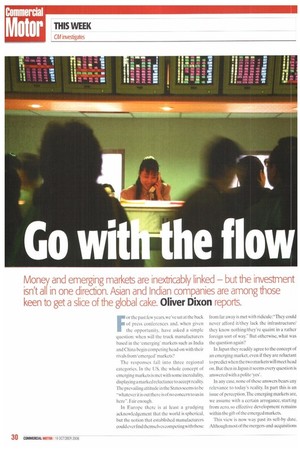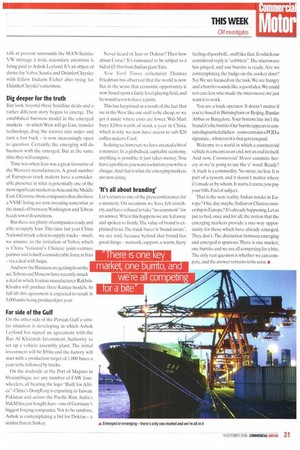Go flo
Page 30

Page 31

If you've noticed an error in this article please click here to report it so we can fix it.
Money and emerging markets are inextricably linked — but the investment isn't all in one direction. Asian and Indian companies are among those
keen to get a slice of the global cake. Oliver Dixon reports. the past few years. we've sat at the hack of press conferences and, when given the opportunity, have asked a simple
question: when will the truck manufacturers based in the 'emerging' markets such as India and China begin competing head-on with their rivals from 'emerged' markets?
The responses fall into three regional categories. In the US, the whole concept of emerging markets is met with some incredulity, displaying a marked reluctance to accept reality. The prevailing attitude in the States seems to be "whatever it is out there is of no concern to us in here-. Fair enough. In Europe there is at least a grudging acknowledgement that the world is spherical, but the notion that established manufacturers could ever find themselvescompeting with those
from far away is met with ridicule:"They could never afford it/they lack the infrastructure/ they know nothing/they're quaint in a rather foreign sort of way." But otherwise, what was the question again?
In Japan they readily agree to the concept of an emerging market, even if they are reluctant to predict when the two markets will meet head on. But then in Japan it seems every question is answered with a polite 'yes'.
In any case, none of these answers bears any relevance to today's reality. In part this is an issue of perception.The emerging markets are, we assume with a certain arrogance, starting from zero, so effective development remains within the gift of the emerged markets. This view is now way past its sell-by date. Although most of the mergers-and-acquisitions
talk at present surrounds the MAN-ScaniaVW mthlage a trois, secondary attention is being paid to Ashok Leyland. It's an object of desire for Volvo. Scania and DaimlerChrysler with fellow Indians Eicher also vying for DaimlerChrysler's attention.
Dig deeper for the truth
But look beyond these headline deals and a rather different story begins to emerge. The established business model in the emerged markets in which West will go East, transfer technology, drag the natives into order and turn a fast buck is now increasingly open to question. Certainly, the emerging will do business with the emerged. But at the same Lime they will compete.
Time was when Iran was a great favourite of the Western manufacturers. A good number of European truck makers have a considerable presence in what is potentially one of the most significant markets in Asia and the Middle East. Of course.those companies that also have a NYSE listing are now sweating somewhat as the stand-off between Washington and Tehran heads towards sanctions.
But there are plenty of companies ready and able to supply Iran. This time last year China National struck a deal to supply trucks much, we assume, to the irritation of Volvo, which is China National's Chinese joint-venture partner and is itself a considerable force in Iran via a deal with Saipa. And now the Russians are getting in on the act.Teh ran and Moscow have recently struck
a deal in which Iranian manufacturer RakhshK hodro will produce three Kamaz models. At full tilt this agreement is expected to result in 5.000 units being produced per year.
Far side of the Gulf
On the other side of the Persian Gulf a similar situation is developing in which Ashok Leyland has signed an agreement with the Ras Al Khaimah Investment Authority to set up a vehicle assembly plant. The initial investment will be $50m and the factory will start with a production target of 1,000 buses a year, to be followed by trucks.
On the dockside at the Port of Maputo in Mozambique are any number of FAW fourwheelers, all bearing the logo "Built for Africa". China's DongFeng is exporting to Taiwan. Pakistan and across the Pacific Rim. India's M&M hasj ust bought Jeco one of Germany's biggest forging companies. Not to be outdone, Ashok is contemplating a bid for Doktas a similar firm in Turkey.
Never heard of Jeco or Doktas? Then how about C:orus? It's rumoured to be subject to a bid of L5.5bn from Indian giant Tata.
New York Times columnist Thomas Friedman has observed that the world is now flat, in the sense that economic opportunity is now based upon a fairly level playing field, and he would seem to have a point.
This has happened as a result of the fact that we in the West like our stuff to be cheap, so we get it made where costs are lower. Wal-Mart buys $20bn-worth of stock a year in China, which is why we now have access to sub-$20 coffee makers. Cool.
In doing so, however, we have created a bit of a monster. In a globalised, capitalist economy, anything is possible; it just takes money. You have a problem,you want a solution,you write a cheque. And that is what the emerging markets are now doing.
It's all about branding'
Lets return to one of the press conferences for a moment. On occasions we have felt crotchety, and have refused to take "no comment" for an answer. When this happens we are led away and spoken to firmly. The value of brand is explained to us. The truck buyer is 'brand aware', we are told. because behind that brand lies good things network, support, a warm, fuzzy
feeling of goodwill...stuff like that.To which our considered reply is "cobblers", The microwave has pinged, and our burrito is ready. Are we contemplating the badge on the cooker door? No. We are focused on the task. We are hungry and a burrito sounds like a good idea.We could not care less who made the microwave: we just want it to work.
You are a truck operator. It doesn't matter if you're based in Birmingham or Beijing, Bandar Abbas or Bangalore. Your bottom line isn't the brand:it's the burrito. Our burrito appears to contain disgruntled chicken -yours contains a POD, a signature... whatever it is that gets you paid.
Welcome to a world in which a commercial vehicle is a means to an end, not an end in itself. And now, Commercial Motor commits heresy as we're going to use the 'c' word. Ready? A truck is a commodity. No more, no less. It is part of a system, and it doesn't matter where it's made or by whom. It starts, it earns, you pay your bills End of subject. That is the new reality. Indian trucks in Europe? One day-, maybe. Indian or Chinese ownership in Europe? It's already happening.Let us put to bed, once and for all, the notion that the emerging markets provide a one-way opportunity for those which have already emerged. They don't:The distinction between emerging and emerged is spurious. There is one market, one burrito, and we are all competing for a bite. The only real question is whether we can compete, and the answer remains to be seen. •


























































































































































































